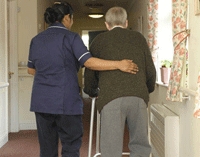
Thousands of overseas care workers could be forced out of the country due to a government crackdown on immigration, the English Community Care Association has warned.
ECCA believes the temporary immigration restrictions on non-EU migrants imposed by home secretary Theresa May in July are unlawful and will have a potentially “catastrophic” effect on England’s care sector. About 13% of staff employed by the sector come from outside Europe.
ECCA has been granted permission for a judicial review of the policy, which reduced the number of work visas issued to people from outside the EU by 5%, compared with 2009 figures.
Martin Green, chief executive of the association, said the restrictions had been rolled out “with complete disregard for care providers and their staffing requirements” and could disrupt continuity of care in residential homes if staff are forced to quit their jobs.
His concerns echo those raised by directors of children’s services, who have called for a rethink of the immigration cap because it could exacerbate the shortage of experienced children’s social workers.
Kashif Majeed, principal solicitor at London-based legal firm Aston Brooke, acting on behalf of the association, said: “Thousands of care workers could be forced to leave their jobs and the country as a result of this policy.
“But the policy of allowing British jobs to be filled by British workers is based on a false premise. In the care sector, these overseas workers are not taking British people’s jobs – they are doing jobs that no one else wants to do.”
The association will base its appeal on the grounds that the Home Office failed to follow correct parliamentary procedures when it introduced the interim limit of 24,100 immigrants. This reduced the number of sponsorship certificates which could be issued by employers, and will remain in place until April 2011, when a permanent limit will come into effect.
Majeed explained that a large number of overseas care workers working in England were from the Philippines, while others were from India, South Africa, and other African countries.
He added that the government set up the Migration Advisory Committee to identify shortage occupations, and included senior skilled carers on the list.
Majeed said: “This recognised that employers could not recruit from within the EU. Therefore, for the home secretary [Theresa May] to claim that this position can be filled from within the EU contradicts her own government findings.”
The judicial review is due to be heard at the High Court in the next few weeks.
Immigration minister Damian Green promised to “rigorously defend” ECCA’s challenge.
“The government has been clear we will introduce our permanent annual limit on economic migrants from outside the EU from April 2011,” he said.
“While we decide how the annual limit should operate it is imperative that we have interim measures in place to avoid a rush of applications from migrants before the new rules take effect.
“We are fully committed to reduce the level of net migration back down to the levels of the 1990s – tens of thousands each year, not hundreds of thousands. Introducing a limit on migrants from outside Europe coming here to work is just one of the ways we intend to achieve this.”
Recent figures from the National Minimum Data Set for Social Care showed that around 13% of adult care staff recruited in the 12 months to June 2010 were from outside Europe. The proportion was significantly higher in London.
What do you think? Join the debate on CareSpace
Keep up to date with the latest developments in social care. Sign up to our daily and weekly emails
Related articles
How will individual care providers fare under the government’s immigration cap? Read our in-depth feature
External information


 Bournemouth, Christchurch and Poole
Bournemouth, Christchurch and Poole  Hampshire County Council
Hampshire County Council  Lincolnshire County Council
Lincolnshire County Council  Norfolk County Council
Norfolk County Council  Northamptonshire Children’s Trust
Northamptonshire Children’s Trust  South Gloucestershire Council
South Gloucestershire Council  Wiltshire Council
Wiltshire Council  Wokingham Borough Council
Wokingham Borough Council  Children and young people with SEND are ‘valued and prioritised’ in Wiltshire, find inspectors
Children and young people with SEND are ‘valued and prioritised’ in Wiltshire, find inspectors  How specialist refugee teams benefit young people and social workers
How specialist refugee teams benefit young people and social workers  Podcast: returning to social work after becoming a first-time parent
Podcast: returning to social work after becoming a first-time parent  Podcast: would you work for an inadequate-rated service?
Podcast: would you work for an inadequate-rated service?  Family help: one local authority’s experience of the model
Family help: one local authority’s experience of the model  Workforce Insights – showcasing a selection of the sector’s top recruiters
Workforce Insights – showcasing a selection of the sector’s top recruiters 

 Facebook
Facebook X
X LinkedIn
LinkedIn Instagram
Instagram
Comments are closed.